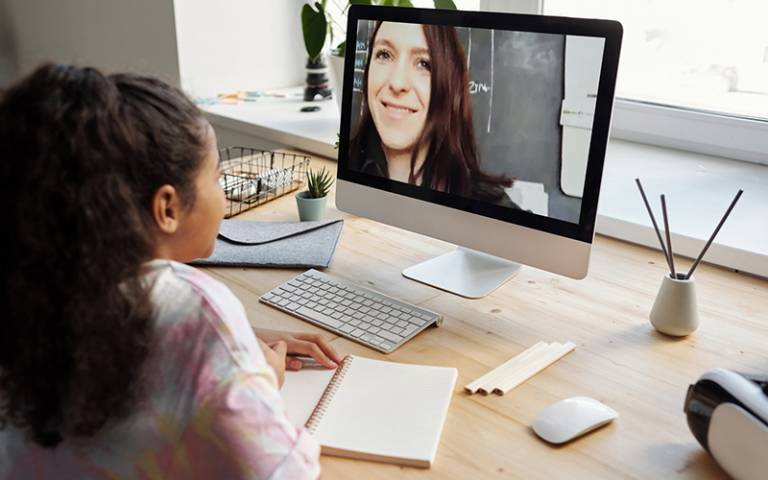IOE academics compile rapid evidence reviews for UK Government
9 September 2021
Several UCL Institute of Education (IOE) academics have compiled rapid evidence reviews on the impact of closures and disruptions to schools, colleges and universities during the COVID-19 pandemic.

Commissioned by the Department for Education, the reviews look at the pandemic’s impact on school pupils, parents and carers of pupils, the further education sector, and UK higher education and what needs to be done to address these issues.
The work was undertaken under the umbrella of the ESRC-funded International Public Policy Observatory (IPPO) and managed by the Evidence for Policy and Practice Information and Co-ordinating Centre (EPPI-Centre), a specialist centre in the IOE’s Social Research Institute which develops methods for the systematic reviewing and synthesising of research evidence, and studies how research evidence is used.
The impact of UK school closures on children during the Covid-19 pandemic
One IOE-authored evidence review looked at children’s learning during the pandemic and noted that impacts stemmed from:
- The differences in time spent learning at home compared to time spent learning in school;
- Differences in the quality of work completed at home;
- Lack of access to remote learning due to inequalities in access to technology.
The authors (Professor Gemma Moss, Dr Alice Bradbury, Dr Sinéad Harmey, Dr Rosie Mansfield, Bridget Candy, Dr Rachel France, Carol Vigurs) noted that school provision for online learning changed radically since the beginning of the first national lockdown, going from just 4% of teachers using online live lessons in March 2020 to more than half of teachers using them.
The reviewers also found that available evidence on children’s mental health and wellbeing was mixed, with both positive and negative effects being experienced.
The evidence shows that children living in poverty have been most affected, particularly through food insecurity and conditions triggering stress and anxiety at home. Additionally, they had limited opportunities to access digital resources for learning, or outside space for physical activity in comparison to wealthier peers.
Parents and carers
A review by academics from the University of Edinburgh, the University of Bath and the University of Oxford noted that lockdowns and school closures had a particularly negative impact on parents and carers.
Parents reported a larger decline in their general mental health, on average, than people without children. Also, levels of parental stress, depression and anxiety all rose during periods of lockdown, particularly among people with children younger than 10 years old.
Available evidence also shows that women, and particularly mothers, were affected more by the pandemic as they spent more time on childcare than fathers and were more likely to reduce their working hours or initiate furlough compared with men or childless women.
Higher education
Professor Elaine Unterhalter and Dr Colleen Howell (IOE’s Department of Education, Practice and Society) examined the impact of the COVID-19 pandemic on higher education and university students. They found that there had been widespread disruption to initiatives designed to widen participation among students from disadvantaged groups. This included programmes aimed at encouraging historically excluded groups from applying to university.
Students’ mental health and wellbeing was also affected with impacted social life, anxiety about future work prospects and concerns about part-time jobs all contributing to this.
COVID-induced shifts to online learning in higher education were not necessarily associated with poor progress or diminished understanding. However, the reviewers highlighted that greater reliance on digital technology creates patterns of inequality that have the potential to exclude groups of learners. They note that this is an issue that is likely to continue beyond the pandemic.
Further education
Professor Ken Spours and Paul Grainger’s evidence review found that the closure of further education colleges meant that the number of students completing existing apprenticeships was down by 49% compared with 2019. This is because their skills acquisition needed to progress to the next stage could not be verified. There were also fewer people starting new apprenticeships in 2020 compared with 2019, with particular falls within the health and social care, business management and hospitality sectors.
The reviewers also highlighted that changes to modes of learning, assessment and qualifications affected people taking vocational qualifications more than those taking GCSEs and A levels because online learning is not possible for some aspects of vocational courses, including assessment.
The review also looked at young people’s mental health and wellbeing across the FE sector, with evidence showing that this worsened due to worries about the impact of the pandemic on their course performance, opportunities for work placements, and future job opportunities.
The findings from each review were presented in an event on 9 September.
Links
- Read 'Rapid Evidence Review: The impact of UK school closures on children during the COVID-19 pandemic'
- Read 'Rapid Evidence Review: The impact of lockdowns and school closures on parents and carers in the UK'
- Read 'Rapid Evidence Review: The impact of the pandemic on the UK Higher Education sector and its students'
- Read 'Rapid Evidence Review: The impact of the pandemic on the UK Further Education sector and its students'
- Closing schools, colleges and universities during the pandemic: what were the effects and how should they be addressed?
- EPPI-Centre
- Social Research Institute
- International Public Policy Observatory
Image
Image: Julia M Cameron from Pexels
 Close
Close

